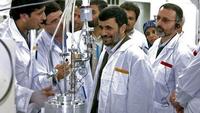-
Egypt’s military involvement in the anti-Islamist campaign in Libya deepens
Two days ago, on Wednesday, Egypt has escalated its involvement in the battle against Libyan Islamists, as Egyptian warplanes conducted a series of attacks on Islamist militias’ positions in the eastern city of Benghazi. In late August, Egyptian and UAE warplanes attacked Islamist positions in and around Tripoli. Egypt’s growing direct military involvement in Libya has turned that country into yet another theater of a proxy war for broader regional battles, with Qatar and Turkey supporting the extremist Islamist militias while Egypt, Saudi Arabia, and the United Arab Emirates backing the militias’ opponents. The growing Egyptian involvement is an indication that after two years of introspection and confusion, the moderate forces in the Arab world have begun to assert themselves in an effort to gain a measure of control over post-Arab Spring developments in the region.
-
-
Turkish jets bomb Kurdish positions
The tensions and acrimony between Turkey and the U.S.-led coalition fighting ISIS have risen to new heights in the last two days. No other country in the region bears as much responsibility as Turkey does for the rise and continuous success of ISIS, and on Monday, Turkey went a step farther in its effort to protect ISIS: Its air force conducted heavy bombing raids against targets of the Kurdish group PKK, one of the more capable Kurdish forces fighting to hold off ISIS and its advances. We should not assume that Turkey’s leaders, pious Muslims though they are, actually espouse or support the extremist version of Islam for which ISIS stands. Rather, Turkey sees ISIS as a tool which, if properly protected, and provided it does not get out of hand, can be used to harass, weaken, or even defeat Turkey’s main adversaries in the region. Turkey’s refusal to contribute to the weakening of ISIS is now running the risk of creating a humanitarian crisis of historical proportions: ISIS forces are closing in on the Kurdish town of Kobani, just inside Syria across from the Turkish border. ISIS has publicly announced that it will kill the 200,000-300,000 Kurdish citizens in the besieged city unless they converted to ISIS version of Islam.
-
-
Why Western boots should stay out of Iraq and Syria

The main reason why we should ignore the growing calls in the United States, Canada and Australia for Western “boots on ground” — meaning ground troops — to fight and destroy the Islamic State (IS) is this: In Iraq and Syria right now there is no alternative group that could fill the void created by a defeated IS. So even if we could topple IS, who would govern the liberated lands? One of the key lessons we learnt from the Afghanistan and Iraq wars is that military forays cannot succeed without a political solution. Attempting to create such a political solution only after the fact is not something that the world has proven adept at. In the case of IS, there is currently no clear and viable political endgame. So as hard as it might be to accept for some, if defeating IS is the goal, the best solution is likely to be isolate the militants and work to weaken them from within in Iraq – this is what the United States did so successfully in 2006 with the same Sunni groups — while adopting a realpolitik approach to the return of Bashar al-Assad in Syria.
-
-
U.S. opens a second drone base in Niger
The Pentagon has reached an agreement with the government of Niger to open a second U.S. drone base in the landlocked country. The base, in the city of Agadez, will help the U.S. Air Force track Islamist militants who have gained control of remote parts of North and West Africa. U.S. and French troops already operate out of a military base in Niamey, Niger’s capital, where drones are set to conduct reconnaissance flights throughout the region.
-
-
Egypt, UAE strike Islamists’ targets in Libya
Last week and again on Saturday, Egypt and the United Arab Emirates (UAE) joined forces to conduct a series of airstrikes against Islamist militias in Libya. In recent months UAE special forces, operating out of Egyptian bases, destroyed an Islamist camp in eastern Libya without detection. The United States was not informed of the airstrikes, and U.S. permission was not sought. The move by Egypt and the UAE is but one more indication that after two years of introspection and confusion, the moderate forces in the Arab world have begun to assert themselves in an effort to gain a measure of control over post-Arab Spring developments in the region. The airstrikes by Egypt and UAE against Libya’s Islamist militias are thus an intensification of the regional campaign, led by Egypt, Saudi Arabia, and the UAE, to confront and defeat the Qatar- and Turkey-supported Islamist forces in the region.
-
-
U.S. to ship arms to Iraq; France to send arms to Kurds
The United States is planning to accelerate arms shipment to Iraq, especially as it becoming clear that divisive prime minister Nouri al-Maliki has accepted the fact that he would not continue in power. The U.S. shipments will include missiles, guns, and ammunition. The shipments will start when Haider al-Abadi officially becomes Iraq’s new prime minister. France has announced it is beginning to ship arms to the Kurds, while Spain and Italy said they would begin to do so shortly
-
-
ISIS militants kill 500 Yezidis, burying women and children alive, forcing 300 women into slavery
Mohammed Shia al-Sudani, Iraq’s human rights minister, on Sunday said that Islamic State (ISIS) militants have killed 500 members of the Yazidi ethnic minority, including some women and children who were buried alive. Another 300 women were kidnapped and forced into slavery. U.S. bombing of ISIS forward units allowed Kurdish forces to recapture two towns taken by ISIS early last week. U.S. is dropping supplies to 40,000 Yezidis stranded on Sinjar Mountain. ISIS leaders announced that Yezidi “devil worshippers” faced a choice: convert to Islam or die on the mountain.
-
-
Iraq’s Yazidis are on the brink of genocide – who will save them?
U.S. president Barack Obama has confirmed that the U.S. military made targeted airstrikes and carried out a humanitarian operation in Iraq, marking the deepest U.S. engagement in the country since U.S. troops withdrew in 2011. There will be no troop presence on the ground. This means that the IS [Islamic State, which is the new name adopted by ISIS] threat won’t be removed from Iraq — at least in the short term. The IS fighters will continue their massacres after the limited U.S. operation has finished. Iraq needs immediate, comprehensive and unlimited military and political assistance to eradicate IS fighters from the country. IS is not just a normal terrorist group and it is not a political opposition. Rather, it has become a professional irregular army with more than 20,000 well-trained soldiers and a very strong ideology, operating in a region from Iraq to Lebanon with many sleeper cells worldwide.
-
-
Opportunities for regional realignment not likely to be seized
After the first twenty-four hours, the 72-hour Egypt-sponsored Gaza cease-fire appears to be holding – something which could not be said for the previous five cease-fires, which were violated by Hamas within minutes of supposedly going into effect. The Israeli delegation yesterday flew to Cairo to begin negotiations on a longer-term arrangement. The reason why this cease-fire is likely to hold has to do with the realization by Hamas Gaza leaders of their isolation and the growing destruction Israel’s attacks were inflicting on Hamas’s war machine and Gaza’s already-dilapidated infrastructure. A militarily weakened Hamas, a moderate Arab block hostile to militant Islam, and a convergence of interests between Israel and the moderate Arab states provide the foundation for profound strategic transformation in the region. It is doubtful, however, that the Netanyahu government will seize the opportunity for a breakthrough in Israel-Palestinian relations, on which such a transformation depends. During the month-long war, Netanyahu has given no indication that he sees this round of Israel-Hamas war in anything other than tactical terms, and has offered nothing to show that he plans to exploit the military results of the war, together with the changing political context in the region, for a bold and creative initiative which would change Israel’s relations with the PA, transform Israel’s strategic position, and realign regional politics.
-
-
Ukrainian military urged Donetsk residents to leave city ahead of attack on rebel stronghold
The Ukrainian military earlier today (Monday) urged residents of Donetsk to evacuate, with more reports of increased rebel attacks on civilians and the Ukrainian military’s plan to clear the way for government troops to advance on one of the insurgency’s biggest strongholds. The military said it has opened extra humanitarian corridors out of eastern Ukraine’s regional capital, and the government will help evacuees to find temporary shelter. Over the weekend, government troops cut off a northern route that had been used by the pro-Russian separatists who control the city to bring in reinforcements of fighters and supplies. The military now has the city, ruled by the rebels’ self-proclaimed Donetsk People’s Republic, encircled.
-
-
“Independent” Kurds need Baghdad more than they’d like
Iraqi Kurds are in a unique position to declare independence in defiance of a seemingly powerless central government in Baghdad following the rapid disintegration of Iraq in the face of the Islamic State in Iraq and As-Sham (ISIS) onslaught. But is independence as simple as that, a fait accompli resulting from a series of unpredictable events? Unpalatable as it may sound to Iraqi Kurds, the KRG needs Baghdad far more than it is prepared to admit. By all means, the Kurdish Regional Government (KRG) should seek to leverage a better deal out of Baghdad — the Kurdish armed forces, or peshmerga, are vital to the fight against ISIS. In terms of full independence, though, the costs seem to outweigh the benefits at present.
-
-
Israel destroys al-Wafa hospital in Gaza City; cabinet considering expansion of Gaza operations

One of the first targets on the first day of the current round of war between Israel and Hamas was al-Wafa hospital in eastern Gaza City. As is the case with other hospitals in Gaza, Hamas used the facility to store rockets and other arms and shelter Hamas fighters, who also use the hospitals’ upper floors for snipers to shoot at IDF soldiers and for rocket launching – some witnessed by a Financial Times reporter. In the case of al-Wafa, the hospital also served Hamas as a command-and-control center. Yesterday (Wednesday), Israel decided that enough was enough, and that allowing Hamas fighters the freedom to operate behind the patients and staff at the hospital, located in central Gaza City, posed too much of a risk for Israeli forces, and Israel Air Force (IAF) planes finished the destruction of the hospital — after the staff heeded IDF warnings and vacated the facility with the remaining patients. A series of powerful secondary explosions proved that the hospital served Hamas for arms storage. The Israeli cabinet is meeting this morning to consider the expansion of the ground war.
-
-
After eight years under siege, Hamas is fighting to stave off a slow death

Hamas and Egypt are currently testing each other’s nerve. Hamas wants to engage the Egyptian government and press the point that they have nothing to do with the Islamist insurgency there, in an effort to get the border crossings open and re-engage with the new al-Sissi administration. But regardless of whether this round of conflict is resolved sooner rather than later, or whether Egypt softens its stance on Hamas, the fundamental challenge facing both Palestinians and Israelis remains the same: to reach a political settlement for a viable Palestinian state where both Palestinians and Israelis can live in peace and security.
-
-
Iran wants to expand its uranium enrichment capacity

Iran’s Supreme Leader Ayatollah Ali Khamenei said on Tuesday that Iran would need significantly to increase its uranium enrichment capacity for future energy needs, dealing a setback to negotiations between the country and world powers.
-
-
Historic proportions of Iraq’s military collapse raise questions about Iraq’s viability
“The scale of Iraq’s military collapse is of historic proportions,” one military analyst said. A recent assessment of the Iraqi military found that 60 out of 243 Iraqi Army combat battalions “cannot be accounted for, and all of their equipment is lost.” American military officials said an evaluation of the state of Iraq’s military revealed that five of the Iraqi Army’s fourteen divisions were “combat ineffective,” including the two that were overrun in Mosul. The United States has spent $1.7 trillion in Iraq since 2003, of which $25 billion were used to equip and train the post-Saddam Iraqi military. The United States received no return on its huge investment in Iraq, but it was hoped that at least the Iraqi military, U.S.-trained and U.S.-equipped, would provide a solid, professional foundation for a new Iraq. Developments in Iraq last week proved that this hope was illusory.
-
- All
- Regional
- Water
- Biometrics
- Borders/Immig
- Business
- Cybersecurity
- Detection
- Disasters
- Government
- Infrastructure
- International
- Public health
- Public Safety
- Communication interoperabillity
- Emergency services
- Emergency medical services
- Fire
- First response
- IEDs
- Law Enforcement
- Law Enforcement Technology
- Military technology
- Nonlethal weapons
- Nuclear weapons
- Personal protection equipment
- Police
- Notification /alert systems
- Situational awareness
- Weapons systems
- Sci-Tech
- Sector Reports
- Surveillance
- Transportation
Advertising & Marketing: advertise@newswirepubs.com
Editorial: editor@newswirepubs.com
General: info@newswirepubs.com
2010-2011 © News Wire Publications, LLC News Wire Publications, LLC
220 Old Country Road | Suite 200 | Mineola | New York | 11501
Permissions and Policies
Editorial: editor@newswirepubs.com
General: info@newswirepubs.com
2010-2011 © News Wire Publications, LLC News Wire Publications, LLC
220 Old Country Road | Suite 200 | Mineola | New York | 11501
Permissions and Policies
